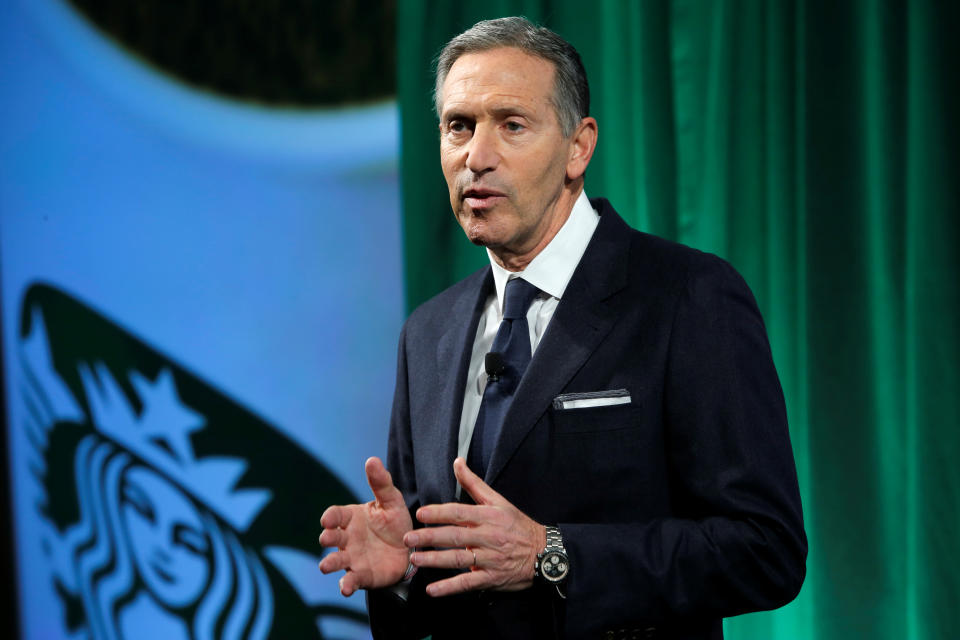Howard Schultz warns of 'carnage' to small biz as coronavirus aid falls short
Howard Schultz, the former CEO of Starbucks (SBUX), said on Thursday that while the $349 billion Paycheck Protection Program (PPP) from the coronavirus stimulus plan is “just a band-aid,” far more is needed for small businesses to survive.
On Thursday morning, The U.S. Small Business Administration effectively ran out of money for the PPP, making the agency unable to dole out emergency loans to cash-strapped applicants. The money was a slice of the $2 trillion stimulus proposed by the CARES Act to stave off the pandemic’s worst effects.
In a wide-ranging interview with Yahoo Finance, Schultz made a case that the government needs an even bigger “trillion-dollar number” to save U.S. small businesses. If the government doesn’t act fast, the ex-CEO warned the economic cost will be “much, much greater for a longer period of time” than what it will cost to help small businesses now.
While the Paycheck Protection Program was “designed to do a good thing,” it’s “just a band-aid for two months,” he added.
“The question really is — how do these restaurants and small businesses reopen? So, the government needs to face the fact that not only do we need a next tranche of money, but we need an understanding, a comprehensive understanding, that in order for these restaurants and businesses to reopen, most of which cannot, we need a significant level of money,” Schultz told Yahoo Finance.
As it stands, the historic bill designed to bolster the U.S. economy that’s been badly damaged by the COVID-19 pandemic focuses much more on big corporations.
“I think the government tried to do their best, but it was rushed, it’s not perfect,” Schultz said.
“But, yes, the way this thing has been structured, it is basically a big business co-authored program. Small businesses have been left behind. They have no voice. They have no resources,” he added.
‘Incalculable’ damage

Schultz rose from humble beginnings to build Starbucks into the global powerhouse it is today, and he has a pulse of the small business community — especially in his hometown of Seattle.
Last week, the Schultz Family Foundation launched The Plate Fund, delivering one-time cash payments of $500 to impacted Seattle and King County restaurant workers, including those who are undocumented, within 48-hours, well-ahead of the federal response.
In less than two weeks, his family foundation’s Plate Fund has received 7,600 applications with $3.8 million already on the way to impacted restaurant staff “as a bridge.” The Plate Fund has raised $7 million so far.
“[The] challenge is many of these people here, most of the people we’ve talked to, still haven’t gotten any financial assistance from the government,” he said.
“When you sit down, like I did last week, with restaurant owners or small business owners who either couldn’t qualify for PPP or didn’t get access to it, it’s heartbreaking,” the billionaire said. “They have put their life savings and their work into these businesses, and they have no way to survive.”
If the government doesn’t act soon, these small businesses won’t be able to reopen, Howard contended.
“So PPP was just designed for a two-month [period], but what we need is a bridge to the vaccine. The vaccine is going to take 12 to 18 months,” he said. “Small businesses in America need an economic loan, bailout, or some way to survive through the vaccine. That’s the issue.”
From Schultz’s perspective, the best way to achieve that is for the government to act as a “backstop” for the banks, so they can provide small business loans could be forgiven or are low interest.
There are nearly 30.7 million small businesses in the U.S., employing around 47.3% of the private workforce, according to the U.S. Small Business Administration. Schultz argues that if the government waits too long, the “economic carnage will be incalculable.”
Congress is currently on recess, and not expected to provide additional monies to the PPP program anytime in the foreseeable future. Shultz warns that a lengthy delay will be “too late” for small entrepreneurs to survive.
“They will have closed their businesses. There will be no connective tissue to them. The government must act now — not for another band-aid, but a comprehensive solution to allow these people to reopen,” he said.
-
Julia La Roche is a Correspondent at Yahoo Finance. Follow her on Twitter.
